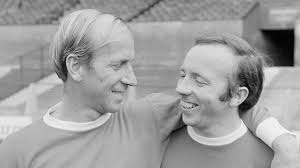November 18 – The English Football Association insists it holds a “clear and unwavering commitment” in the battle against dementia after the family of former England World Cup winner Nobby Stiles hit out at a failure to address the “scandal” of the illness.
Manchester United’s former combative midfielder died on October 30 at the age of 78, having been diagnosed with dementia as well as suffering from prostate cancer.
Sir Bobby Charlton was recently revealed to be the fifth member of the 1966 World Cup-winning team to be diagnosed with dementia. His brother Jack, Ray Wilson, Martin Peters as well as Stiles have all died of the condition over the last two-and-a-half years.
On Tuesday, the Stiles family issued a statement saying there was “a need for urgent action” and that older players had “largely been forgotten”.
“How can it be that these players are left to struggle when the Premier League receives 3 billion pounds a year?” John Stiles, Nobby’s son, was quoted as saying.
“How can it be right that some of the heroes of 1966 had to sell their medals to provide for the families? How can it be that these players are left needing help when their own union has tens of millions of pounds available? These older players have largely been forgotten and many are in ill health… I hope dad’s death is the catalyst for this scandal to be addressed.”
The FA insists it treats dementia as a serious issue.
“The FA has helped to lead the way in ground-breaking research into the links between football and we have a clear and unwavering commitment, both financially and with resource, to support objective, robust and thorough research going forward,” it said.
“We have also given our support for the trial of concussion substitutes via the International Football Association Board, world football’s governing body that determines the Laws of the Game.”
The Professional Footballers’ Association said they were “evaluating ways to improve the services and care provided”, adding they would liaise with families of players on how they can be of greater help while also funding research.
Geoff Hurst, England’s hat-trick hero from the 1966 final, said heading the ball too often in practice was dangerous, especially among kids who, he said, should not be doing it until they are old enough.
“The danger for me is the amount of times you head the ball in practice and not in a game,” Hurst told The Daily Telegraph. “Going back, I wouldn’t do the practice. I would cut that out.”
Contact the writer of this story at moc.l1745007960labto1745007960ofdlr1745007960owedi1745007960sni@w1745007960ahsra1745007960w.wer1745007960dna1745007960

